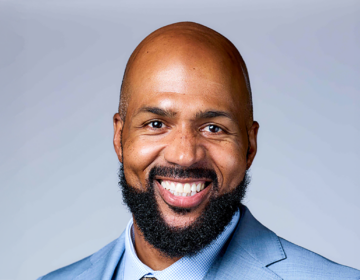Beyond burnout: One teacher’s trip back into the classroom
ListenTim McAleer’s day job is part stand-up comedian, part host to hordes of sunburned tourists aboard Philadelphia sightseeing buses.
It’s a pretty big departure from his last gig, as a middle school English teacher in West Philadelphia.
In Philadelphia, public school teachers drop out at a higher rate than students. Seventy percent leave the profession in their first six years, according to 2007 report by the National Commission on Teaching and America’s Future.
McAleer’s experience supports that statistic. At first, he thought leading tours around Center City and parts of West Philadelphia might just be a summer job.
“I knew I would enjoy it,” he said. “I knew that it would allow me to entertain.”
On any given weekend day, he leads three tours, simultaneously pointing out historical sites and ushering patrons on and off the route’s 27 stops. Oh, and he takes a lot of cracks at New Jersey (where he lives).
McAleer left teaching in 2013, after four years at Catholic and charter schools in Philadelphia and five years of substitute teaching in New York City. In many ways, that path was preordained, although it took him a while to get there.
“My family was pushing me in that direction, and I think that pushed me away from it,” said McAleer. Instead, he worked as an on-court security guard for the US Open, stand-up comedian, substitute teacher and sports coach.
“I’m starting to sound like Forrest Gump,” he said, ruefully.
‘I was going to change the world’
The pull of the classroom proved irresistible. “Right before I moved out of New York, I coached a varsity [baseball] team, and I saw I could have an impact,” he said. “That’s when I decided I was going to school and get my degree.”
Almost immediately after he finished his studies, a midyear replacement position — teaching eighth grade — opened up in a Philadelphia Catholic school.
“They had run two other teachers out before me,” said McAleer. Still, he said he was optimistic. On his first day, “I came in all inspired, I was going to change the world.”
His ideals quickly crashed into reality. In response to an essay prompt from McAleer, one of his students took him to task. “He said he’d seen this movie a thousand times before, the young Caucasian was going to come into the inner-city school and inspire his kids with words.”
“Then he compared me to Michelle Pfeiffer,” he said. That is, Pfeiffer playing an ex-Marine-turned-inner-city-teacher in the 1995 film “Dangerous Minds.”
Mocked but not dispirited, McAleer kept teaching for four years, winding up at a charter school in West Philadelphia. He said he enjoyed engendering trust in his students, including the one who made the “Dangerous Minds” comparison.
Maintaining that trust and fulfilling his professional duties were sometimes at odds, said McAleer.
“Every time I saw an issue, that I wanted to step in and try to help someone, I was mandated to report it,” he said. “And once I reported it, that was the end of being able to interact with whoever that student was.”
In one instance, he and his now-fiancée became close with a family of nine — seven children and two parents living in a two-bedroom row home in West Philly. They’d take the kids out for pizza or to a ball game every few weeks.
One day in March 2013, McAleer and his fiancée went to pick up the kids for an outing — and he noticed something was off.
“Their 16-year-old daughter came [to the door] with her blanket wrapped around her, shivering,” said McAleer.
The family’s boiler was broken, so all of the family members were huddled with electric space heaters in the two bedrooms. That’s when McAleer said he knew he had to help, “just the thought of how dangerous that is.”
McAleer went to his charter school’s CEO and asked if the school could make an effort to help the family. She assured him that they would.
“The following morning, she contacted the principal who then contacted child welfare services.”
McAleer said he was never able to re-establish trust with the family.
“I remember, after that, asking the fifth-grader if he was hungry, and he said, ‘No’,” said McAleer. “I said, ‘Would you tell me if you were?’ And he said, ‘No’.”
The next summer, he left teaching and started tour-guiding. “I realized that the things I wanted to do, the reasons I became a teacher, I couldn’t necessarily do.”
A detour
While leading tours, McAleer took some time to work on personal projects. He started writing a novel and took a few grant-writing classes. In his downtime, he and his sister — a teacher and a certified reading specialist — started bouncing around ideas for a way to teach and impact kids on their own terms.
An organizational plan started to take shape, combining strengths and interests from McAleer and his sister’s backgrounds: literacy training, mentorship and a pay-it-forward focus on service. With a captive audience at his day job, McAleer started to pitch his idea on tours.
Tourists gave feedback and some even volunteered to help. One woman, a new arrival to Philadelphia and a social media expert, built the nascent organization — Teach 2 the Core — a website.
Eventually, McAleer landed in front of Jim Burnett, the executive director of the West Philadelphia Financial Services Institution.
Burnett runs a program through WPFSI called WesGold Fellows, a summer college prep and financial literacy program. He saw an opportunity to use the skills of McAleer and his sister. The fellows, mostly juniors in high school, are paid to attend a summer program where they learn about the college application process, personal finance and communication skills.
When asked why he took a chance on McAleer, Burnett chuckled. “We’ve taken a chance on a whole lot of people.”
Burnett signed up Teach 2 the Core to up the ante of the program’s commitment to reading comprehension and writing. Twice a week, McAleer and two reading specialists work with students on Common Core vocabulary and reading comprehension. Burnett has also signed on to fiscally sponsor Teach 2 the Core.
“So far Tim and his team have been everything we expected them to be,” he said.
Whether McAleer’s organization will become viable as a nonprofit remains to be seen. For now, he’s back where he wants to be.
“I want kids to remember me. I want kids to look back one day and say, ‘That’s the reason I am where I am.’
“It’s not the most selfless thing,” he said. “I get a lot out of it.”
WHYY is your source for fact-based, in-depth journalism and information. As a nonprofit organization, we rely on financial support from readers like you. Please give today.







